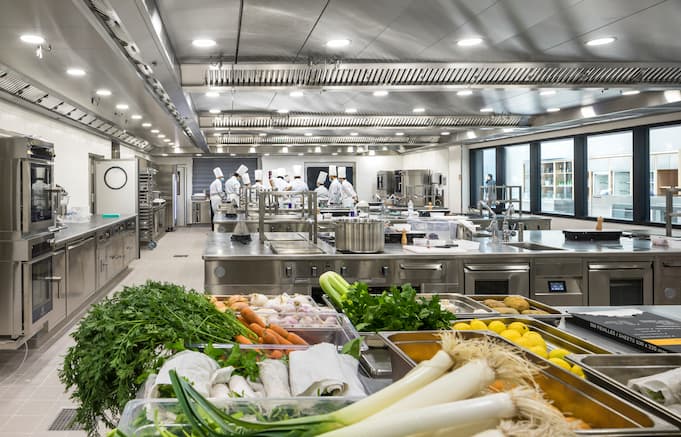Sustainability in restaurants and why it matters

Introduction
In a world where environmental concerns are becoming increasingly pressing, the concept of sustainability has gained significant traction across various industries.
The restaurant sector, in particular, has recognized the importance of integrating sustainable practices into its operations. For young professionals and career changers who possess a passion for eco-friendly initiatives and the culinary arts, the restaurant industry offers a unique avenue to make a positive impact through the science of cooking.
In this article, we’ll explore sustainability in restaurants, exploring its definitions, importance, and impact. Definition of sustainability Sustainability is necessary to conserve our planet.
The concept of sustainability is looking for a comprehensive approach to living that lowers environmental impact. Sustainable living meets the needs of present generations, without compromising the ability of future generations to meet their needs.
This involves conserving natural resources, minimizing waste and pollution, promoting social equity and well-being, and ensuring economic viability over the long term.
What is a sustainable restaurant?
A sustainable restaurant is one that operates with a conscious commitment to minimizing its environmental impact, supporting local communities, and promoting social responsibility.
Key principles of sustainability in restaurants include sourcing local and seasonal ingredients, reducing energy and water consumption, minimizing waste, and supporting ethical labor practices.
By focusing on these principles, sustainable restaurants aim to create a holistic approach that benefits not only their business but also the environment and society at large.
These are all important things to consider if you decide to start a restaurant business.
Become the next top chef with a diploma in culinary arts
Refine and elevate your approach to food with insights from industry leaders and exclusive professional placements combined with the latest developments in sustainable practices.
Diploma in culinary arts
Why is sustainability important in the restaurant industry?
The restaurant industry's growing emphasis on sustainability is rooted in several factors.
Firstly, sustainable practices have a direct positive impact on the environment. By reducing energy consumption, carbon emissions and water and food waste, restaurants contribute to the preservation of natural resources and the mitigation of climate change.
Secondly, adopting sustainable practices can lead to significant cost savings for businesses. Efficient energy use, waste minimization, and responsible sourcing translate into reduced operational expenses.
Lastly, the increasing demand for sustainable dining options from consumers is shaping the market. According to a survey of global restaurants, restaurant sustainability practices heavily influence buying decisions, so restaurants that prioritize sustainability can attract a dedicated customer base and enhance their brand reputation.
The impact of sustainability on restaurants
With the shift towards sustainability, there are multiple changes we can see in restaurants. Most notably, venues now look more carefully at their energy and water consumption, as well as their emissions and waste.
Energy consumption
Restaurant operations are energy-intensive, from cooking equipment to lighting and climate control. Energy conservation not only helps the environment but also lowers operational costs.
To reduce energy consumption, restaurants can invest in energy-efficient appliances and restaurant technology, implement LED lighting, and establish practices that optimize energy usage.
Carbon footprint and greenhouse gas emissions
The carbon footprint of a restaurant refers to the total amount of greenhouse gas emissions produced through its operations.
Food systems contribute 34% of global greenhouse gas emissions according to hospitality solutions provider Seven Rooms. By measuring and subsequently reducing this footprint, restaurants can help make a substantial contribution to alleviating climate change.
Strategies for reducing carbon emissions include transitioning to renewable energy sources, optimizing transportation logistics, sourcing local ingredients, and being more energy-efficient.
Additionally, carbon offset programs allow restaurants to invest in projects that counterbalance their emissions. Many restaurants are also turning to more plant-based menus and avoiding a reliance on meat to help reduce their carbon footprint.
Water usage
By conserving water, restaurants contribute to water resource preservation and reduce operational costs. To do this, they can implement water-saving technologies such as low-flow faucets, efficient dishwashing practices, and water-recycling systems.
Waste in restaurants
Waste reduction minimizes landfill contribution and also positively impacts the bottom line through cost savings. Food and packaging waste are a significant challenge for restaurants, which they can overcome by composting organic waste, recycling materials, and practicing portion control.
Benefits of sustainable practices in restaurants
Embracing sustainability offers numerous advantages. Financially, sustainable practices lead to cost savings through enhanced operational efficiency.
A restaurant's commitment to sustainability can also boost its brand reputation and foster customer loyalty. Beyond financial gains, sustainable practices contribute positively to the environment and the broader community.
Inspiring examples of sustainable restaurants
For example, Petersham Nurseries Restaurant in London celebrates the slow food movement, using traditional growing methods and sourcing seasonal ingredients from local suppliers and their own farm.
Nearly all the waste from their restaurant is recycled and their chefs’ jackets are made from recycled bottles.

Image credit:Petersham Nurseries Restaurant
In New York City, Rosemary’s opened more than a decade ago and has become synonymous with the farm-to-table movement. It has its own rooftop farm that supplies seasonal ingredients and it aims to offer a zero-waste menu.
Change the world one dish at a time
Combining intensive culinary arts training with rigorous academic studies of business and management, our world-leading course prepares you for a successful and sustainable career in the restaurant industry.
Qualifications and skills for working in sustainable restaurants
A career in sustainable restaurants requires a blend of culinary skills and a passion for the environment.
Chef training, experience in sourcing local ingredients, waste reduction techniques, and energy-efficient practices are all valuable. Strong communication skills, adaptability, and a commitment to continuous learning are essential for thriving in this dynamic field.
One great way to aim for a chef career in sustainable cooking is to study at a respected culinary school. This will allow you to build on your culinary skills while also learning how to protect the environment.
Plus, you can find courses with professional internships, which give you hands-on experience in a professional kitchen.
Conclusion
Sustainability in the restaurant industry is a necessary shift toward a more responsible and resilient future. From reducing energy consumption and carbon emissions to minimizing food waste and supporting local communities, sustainable practices offer a multitude of benefits.
As young professionals or career changers, embracing sustainability in the restaurant industry and through food entrepreneurship is not only a rewarding choice but also a significant way to contribute positively to the environment and society.
By adopting sustainable practices and exploring careers in sustainable restaurants, you can become a driving force behind positive change in the culinary world. Start by researching culinary degrees at respected culinary schools to launch your career in sustainable restaurants.
Photo credits
Main image: John Rensten/ The Image Bank via getty images



